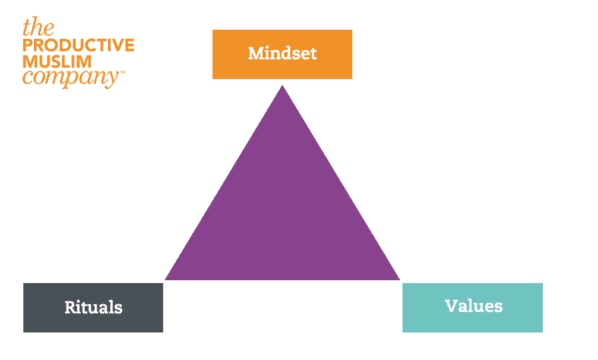This article is a long one, but it’s for those of you who are serious about living the next best version of yourself post-Ramadan.
Ramadan ended a few weeks ago, and by now you’re probably starting to settle back to your post-Ramadan routine.
You may have been able to keep up with some of your Ramadan resolutions (fasting a bit more, praying some parts of the night, giving charity often), or you may have crashed post-Ramadan and found it really hard to pick yourself up again – spiritually, physically, and socially.
If you’re someone who wants to maintain consistent improvement post-Ramadan and win the battle of life against your Nafs and Shaytaan (which seems to come back stronger after Ramadan), then you’ll find this useful.
Begin with Next Ramadan in Mind
Fast-forward to the 29th day of Sha’baan of next year, you’re hours away from knowing if Ramadan is tomorrow or not. You’re excited. Maybe a bit nervous. Busy with typical Ramadan preparations.
Unfortunately, the Angel of Death comes and takes your soul in those hours, and you’re deprived of witnessing the next Ramadan.
How do you feel?
The reason I bring this thought up is to help frame this article in your mind: Although you’re not guaranteed to live to witness another Ramadan, this does not mean that your journey of self-development and improvement should be on hold until next Ramadan comes.
There are many things you can do in between now and then and this is what this article is about.
A Framework To Develop Yourself Post Ramadan
The Productive Muslim Company is big on building frameworks that help us tackle some of our most profound self-development challenges. And one of the frameworks that we often use in our training and coaching is the following one:

This framework simply states that if we want to design the next best version of ourselves post-Ramadan, we need to think of the Mindsets, Values, and Rituals that would help us make those changes post-Ramadan.
Mindsets: How You Think Affects How You Behave
It’s common knowledge among psychology circles that our thoughts have an impact on our actions (and vice-versa. More on that later). [“How Thoughts Influence Actions”. Psychology Today]. So how you think about your post-Ramadan period will impact how you behave. Below are 3 mindset shifts that you need to think about to help you upgrade your post-Ramadan experience.
1. Think Realistically
There’s an equation that I learned from a time management expert that helped me a lot manage my stress levels:
Expectations > Reality = Stress
Simply stated, when expectations exceed the reality, you’re only setting yourself up for stress and failure.
How do we do this post-Ramadan? Have you heard yourself say things like: After Ramadan, I’ll pray tahajjud every night, I’ll fast every Monday and Thursday, I’ll give charity every day, etc.? What happens when you don’t live up to those expectations? You fall for the classic Shaytaan trick of making you feel terrible that you didn’t live up to your expectations and fall for another psychological trap called the “What the hell effect.” [“How the What the Hell Effect Impacts Your Willpower”. Psychology Today]
Here’s how the what the hell effect works: You decide to eat healthily and stop eating sugar, and for the first few days, you’re doing great. Then you get invited over to your friend’s house, and they have an incredible dessert spread. Initially, you resist, but your friend insists, and you have a small piece of Halwa. Next think you know, you say to yourself, “What the hell, let me try everything else, I’ll restart my diet tomorrow.” Next day you feel so bad that you break your new diet, and another “what the hell” moment hits you, and you give up entirely on your new diet.
Think of how many times the “what the hell” effect impacted you when it came to your prayers, to voluntary fasting, to being present with your children. Allah SWT captures this phenomenon when he tells us about not following the steps of Shaytaan in a number of verses, like:
” O you who have believed, enter into Islam completely [and perfectly] and do not follow the footsteps of Satan. Indeed, he is to you a clear enemy.” (Qur’an 2: 208)
So how do you tackle these two traps: setting high and unrealistic expectations, and falling for the “what the hell” effect? The key is to set small, realistic expectations and then guard them with all your might until they become solid habits before you set higher expectations.
Here’s how this works: You want to pray tahajjud every night? Start by committing to pray 1xrak’ah of witr prayer after Isha prayers and before you sleep. It’s a small commitment, but you want to do it no matter what. Even on days you don’t feel like it or you’re tired. Don’t get on the slippery slope of missing 1 day and thinking “what the hell, I’ll never be able to pray tahajjud in my life.” And even if you do slip 1 day, don’t fall for the “what the hell” effect and instead pick yourself up the next day, stronger than ever. Once you’ve established this routine long enough and it has become part and parcel of your life, upgrade yourself and aim to pray 3 rak’ahs of witr, etc.
2. Think Holistically
The second mindset shift to consider is to think about your personal development journey holistically.
During the Productivity Masterclass, we help individuals and teams think of how to live the next best version of themselves across all their roles, i.e., what does your next-best version of yourself look like as a Dad/Mom? as a professional? As a neighbor? As a Muslim? Etc.
Thinking holistically removes the mind-trap that post-Ramadan self-development is only about rituals. It makes us recognize that the rituals form the bedrock and scaffolding to help us build our next best version across our roles.
To help you think holistically about your self-development, complete our Productive Muslim Self-Assessment tool to figure out where you are today – spiritually, physically, and socially and where you need to go.
3. Think Long-Term
One of the primary reasons people give up their post-Ramadan resolutions is that they measure their success or failure based on a very short time frame, i.e., they measure how well they are performing in the first 2-3 weeks post-Ramadan. If they see no improvement, they give up!
Someone might say, “I tried fasting Mondays and Thursdays after Ramadan, but it was too hard, so I gave up.”
What if we expanded our self-development journey beyond these first 2 weeks instead? What if we asked ourselves – how can I develop this new habit/routine in 12 months?
Here’s a thought: We tend to overestimate what we can do in a short period but underestimate what we can do over a long period.
Yes, waking up for fajr might seem hard in those first 2-3 weeks, but if you focus on developing this habit over 3, 6, 9 months, you’ll eventually crack it, and it’ll become easy for you.
A good metaphor for thinking long-term is that of a gardener. When the gardener plants his seed, waters his garden, and works hard all day on his farm. He doesn’t expect to see a mature tree the next day! He understands that growing a tree takes time, and a lot of energy, focus, and time goes into becoming a tree. Similarly, new habits and routines take time to take root, nurture and grow, if you think of them as a long-term project, and work on it daily, you’re more likely to succeed.
PRACTICAL TIPS
- Think of your long-term goals post-Ramadan across all your roles
- Think of the obstacles you might face to achieve your goals (be realistic)
- Think of how to overcome those obstacles – one step at a time.
Values: What Beliefs are driving your post-Ramadan life?
This section talks about a subtle but essential spiritual element when it comes to achieving a post-Ramadan goal. And that is to do with our Hearts and how connected we are with Allah SWT when it comes to achieving our post-Ramadan Goals.
Every day in our prayers we recite this verse →
“You Alone We Worship, and You Alone We Seek Help From” (Qur’an 1: 5)
This is a foundational concept in our faith that is critical for all our self-improvement endeavors. It involves two aspects:
- You Alone We Worship: All your goals, all your self-improvement, and self-development, should be connected to the concept of you wanting to become the best ‘Abd’ (Slave) to Allah SWT. During the Productivity Masterclass, we speak in detail of the Islamic-psychospiritual model of the human being and how being an ‘Abd’ (slave) of Allah SWT is such a foundational concept that we need to revive in our hearts to help us live the best version of ourselves.
- You Alone We Seek Help From: This is the recognition that as part of us acknowledging that we’re slaves of Allah, then we need to ask Allah’s permission and tawfeeq (success) in all the goals that we want to achieve.
Let’s be honest; sometimes, the goals we set for ourselves post-Ramadan can be all about developing our self-esteem and self-image. We forgot the ‘why’ that should drive these goals, and hence we give up on them too quickly. If I’m trying to wake up for tahajjud just because I see it as another milestone in my self-development journey, and not as an act of worship that would get me closer to Allah SWT, I need to revise my intentions.
So how can we practically develop these beliefs/values in our lives:
- Set Good Intentions: When you set any post-Ramadan goal, ask yourself – why am I doing this? Who’s this for? How can I become a better ‘Abd’ to Allah through this goal?
- Always Ask Allah To Help With Your Goals: Make your goals as spiritual quests. Ask Allah SWT to help you stay physically healthy post-Ramadan, to fast regularly, to pray tahajjud, etc. Don’t be arrogant and rely on your means – you need Him. Ask Him.
- Work Hard: Good intentions and prayers don’t work on their own. Allah SWT would like to see the effort from you and He’ll take care of the results.
Rituals: What You Do Impacts How You Think and What You Believe
Earlier I mentioned that just like our thoughts have an impact on our actions. So does our action have an influence on how we think?
Here’s a simple experiment: Let’s say you’re upset, or in a bad mood. Grab a pencil and bite it between your teeth, forcing you to smile. Notice how your levels of happiness will increase, and you’ll feel better.
What does this mean for us, post-Ramadan?
This means that whether we feel like it or don’t feel like it – we need to commit to some rituals post-Ramadan that’ll help us improve how we think about ourselves and what we believe is possible post-Ramadan.
There are 3 key concepts to keep in mind though to ensure that you stick to your rituals post-Ramadan:
- Choose To Focus on Not More Than 3 New Rituals Post-Ramadan: It’s so tempting after graduating from Ramadan to feel that you can change your life 180 overnight and introduce so many new routines in life. Although it is doable, it’s tough and I’d rather you focus on a winning strategy instead. The winning strategy is to focus on 3 new rituals post-Ramadan, and once they become part of who you are, add some more.
- Start Small: This is critical. The smaller the change in your life, the longer it lasts. Start small but have the intention that you’ll want to grow this ritual over time.
- Celebrate Progress: When you do your small ritual – celebrate it. Feel good about it. Thank Allah SWT that he enabled you to make one small step towards the next best version of you and being His ‘Abd.’ Celebration will reinforce this ritual in your brain as something pleasant to be done again.
What should happen when I make the above shifts in my Mindsets, Values, and Rituals?
Fast forward your life to the 29th of Sha’baan next year, it’s a few hours before Ramadan might be announced. You’re excited and giddy and can’t wait to find out.
You’ve spent the entire year, slowly but surely, upgrading your mindsets, values, and rituals and living the next best version of yourself: spiritually, physically, and socially.
You feel more ready than ever for Ramadan and for the next spiritual boost.
However, the Angel of Death comes to you in those hours before Ramadan and takes your soul away.
Do you have any regrets?
Or do you feel that you’ve done all you can to be a true Abd of Allah SWT throughout the year and you are ready to meet Him?













Leave a Reply